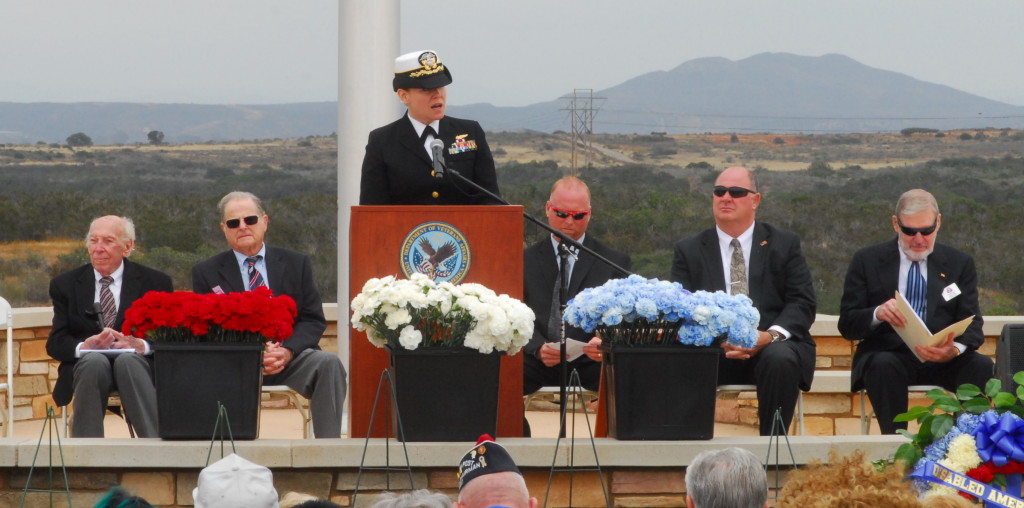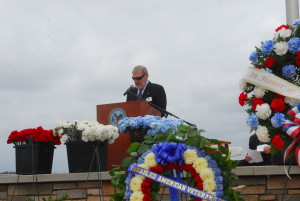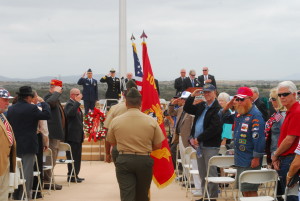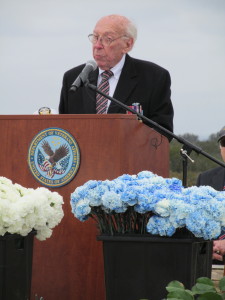
Speakers Cite Sacrifices of Women in Armed Forces;
Describe Harrowing Escape from WWII POW
Camp During Veterans Memorial Service at Miramar National Cemetery



Since the American Revolution, women have borne the hardships of war and frequently have made the ultimate sacrifice of their lives, Navy Capt. Laura M. Scotty told an audience of some 500 during the fourth annual Veterans Memorial Service, May 24, at Miramar National Cemetery.
Joining Scotty on the podium as guest speaker was Joel D. Sollender of Poway, who was taken prisoner by a German Army tank crew near the French border in World War II. Held for four months in a POW camp, and later by the Russians, he managed a perilous escape across hostile territory to American lines.
The Miramar National Cemetery Support Foundation sponsors the annual Veterans Memorial Service. Richard Sells, Foundation secretary and chief financial officer, presided at the event.
Board member Charles Bailey was chairman of the event, and Board member Vicki Nenner assisted with arrangements, including medical staff.
Also participating in the ceremony were Cemetery Director Douglas Ledbetter, Chaplain Henry E. Thomas of the California Air National Guard, former Board member George Fellows, the Young Marines Color Guard, Roy Zanni of Bugles Across America, Bagpiper Larry Samuels, the Westwind Brass, and the U.S. Navy League Sea Cadets.
Capt. Scotty, a Naval Flight Officer who serves as Assistant Chief of Staff for the Commander, Navy Reserve Forces Command, noted that the role of women in the Armed Forces has expanded over the years from non-combat clerical staff, or nursing jobs, to front-line positions in ships, submarines, aircraft, and on the battlefield. Today, women comprise nearly 15 percent of America’s active duty military and just over 19 percent of the reserve force, she said.
Reflecting on the more than 6,300 currently interred at Miramar, Scotty called particular attention to Lieut. Cmdr. Mary J. Crothers, a Navy Nurse Corps Reserve officer who was among the first four veterans to be buried at the cemetery when it opened in 2010. (Click here for full text of speech.)
Citing statistics of women’s participation from the Revolution, to the Civil War, Spanish-American War, World Wars I and II, Korea, Vietnam, and more recent conflicts, Scotty paid tribute to the hundreds of women who lost their lives in service to the nation.
She described the service of two women with San Diego ties: Army nurse Capt. Jennifer Moreno, who was killed by a roadside bomb in Afghanistan in 2013; and Marine Corps pilot Capt. Elizabeth Kealey, whose helicopter crashed during training in 2015. She also mentioned Navy pilot Lieut. Valerie Cappalaere Delaney, who was killed in 2013 when her jet crashed during training at Naval Air Station Whidbey Island, Wash.
It is important on Memorial Day, Scotty said, to honor those women, “…and all those that have died in service to our country, that we remember, we pay tribute to, and we thank those men and women that have made the ultimate sacrifice for the freedoms we enjoy today and every day.”
In his remarks, Joel Sollender, a native of New York City, took the audience back to December 1944, when he was a platoon scout fighting with Patton’s 3rd Army during the Lorraine Campaign in northern France. When his unit ran out of ammunition, he and others were captured by a German tank crew.
Sollender spent four months in a POW camp before liberation by Russian troops. He soon realized, however, that the Russians were holding him hostage. He and a buddy, Bill Carter of Clinton, Mo., managed to escape, and walked 30 miles through German territory to Allied lines. (Click here for Sollender’s biography.)
After he was captured, Sollender said, “We suffered through a transport to prison in a locked boxcar, jammed with prisoners, with one bucket in the corner for our wastes. We were abandoned on the tracks when Allied planes bombed the train and the engine sought cover in a tunnel.”
More than 40 POWs were killed on Christmas Eve in a Royal Air Force bombing raid against the German installation at Limberg. It was one of the coldest winters on record, and the men suffered from frostbitten feet, and subsisted on scanty rations, he said. (Click here for full text of speech.)
Sollender and Carter went their separate ways after the war, but the two old comrades reconnected in 1993. “Over the years, our thoughts often returned to that special time and place,” and when they finally reunited, he said, “our world was once again one.”
